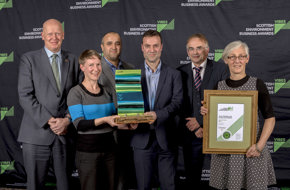Highlights
- Fish waste from SSC’s processing plant is combined with household and garden waste and then used as part of the feedstock for an anaerobic digester.
- The biogas produced fuels a CHP with some of the electricity being used to produce hydrogen and oxygen for use at SSC’s hatchery and as a fuel for CnES’s hydrogen powered bin lorry.
- This project will help sustain the local economy and is the first of its kind in Scotland.
- The OHLEH is a great example of local collaboration which could act as a blueprint for national best practice, not just by the salmon farming industry but across many other sectors.

The Outer Hebrides Local Energy Hub (OHLEH) is a multi-sector partnership made up of The Scottish Salmon Company (SSC), Pure Energy Centre (PEC), Community Energy Scotland (CES) and Comhairle nan Eilean Siar (CnES). The partnership was brought together to encourage collaborative solutions to waste management
and energy challenges.
The OHLEH initiative focuses on the creation of a local circular energ economy and was funded by the Scottish Government Local Energy Challenge Fund. The project has developed into a unique initiative, which is the first of its kind in Scotland and will help sustain the local economy.
The project was managed by CES and involves the transfer of fish waste from SSC’s processing plant on the Isle of Lewis, which is then integrated with other local household and garden waste and broken down to produce biogas in an anaerobic digester (AD), based at the CnES Household Waste and Recycling Centre at Creed. The biogas fuels a Combined Heat and Power (CHP) plant with some of the electricity generated used to drive an electrolyser installed by PEC. The hydrogen is then used in a fuel cell installed by PEC. This in turn produces green hydrogen and green oxygen for use at SSC’s hatchery in Lewis, as well as providing hydrogen fuel for CnES’s hydrogen powered bin lorry.
Through the project, SSC has been able to divert fish waste from landfill to become a useful feedstock in the CnES AD for the generation of power via the CHP. This reduces landfill costs and the reduction of emissions meaning a cheaper and greener solution for fish waste. The CHP generates “green” electricity and fuels, and a local oxygen source, reducing reliance on fossil fuels, decreasing CO2 emissions and transport costs. This green production of both oxygen and hydrogen from waste is a first for aquaculture.
The Partnership Scotland Award recognises organisations with the strategic vision to acknowledge that working in partnership can improve their overall contribution to sustainable development. The judges felt the OHLEH was an excellent example of a multisector partnership which will help both the environment and the local economy in the Western Isles. They felt they were a worthy winner of the Partnership Scotland award.
The judges were also impressed that not only does the project provide an alternative to landfill for SSC fish waste, it also provides a local supply of hydrogen and oxygen both of which can be utilised by SSC at their hatchery.
The project also supports the existing local workforces, and creates roles in civil engineering, designing, mechanical and electrical engineering.
David Macleod, Head of Municipal Services at Comhairle nan Eilean Siar, said: “This is an excellent achievement by all the partners, coming together to deliver a circular economy project using groundbreaking technology. This further demonstrates that it is possible for us to build a sustainable hydrogen economy in the Western Isles.”